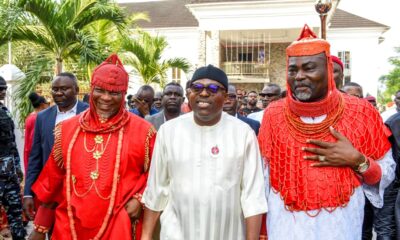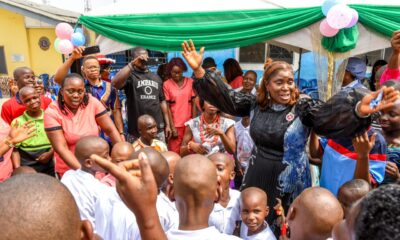Opinion
Nigeria And High Sea Piracy
On January 29th, 2014, PSV Cee Jay liner was
attacked by pirates and boarded off the coast of Bayelsa State. The pirates kidnapped the master and chief engineer and robbed the crew. The next day, the Tug Lamnalco Hawk was attacked and boarded by 3 pirates in Pennington Terminal area of the same Bayelsa State.
2014 is continuing a harrowing trend that has won Nigeria a top position in the global high sea piracy charts. As Nigeria achieves greater ‘successes’ in events of boat capture and robbery, global levels have recorded appreciated drops. The total events of piracy according to the International Maritime Bureau were 264 in 2014 compared to 297 in 2012 and 439 in 2011. But events off West Africa’s coast are increasing.
Of the 51 events in the Gulf of Guinea, Nigeria had 31 last year, overtaking Somalia on the east of the continent, which had only 15 episodes of piracy that same year. Reports have it that Nigerian pirates are even involved in cases far out from its bay, across Togo, Gabon and all the way up to Ivory Coast, making the registered total Nigerian events lower than actual.
Though Indonesia had the greatest total number of events, these were low level opportunistic thefts. Africa’s shores recorded the most dangerous high level incidents of piracy globally, with Nigeria topping the list.
Nigeria’s Joint Task Force (JTF), is reported to have increased efforts to stem increases in these terror events off Nigeria’s shores; however a lack of proper redress for criminals and a culture of impunity for successful thieves, makes the impact of its effort to combat this new vocation of the nation’s southern states questionable.
An extensive report on oil theft in the Niger Delta in October last year, by the Stakeholder Democracy Network (SDN), indicted the very JTF and maritime police in aiding and abetting these criminal activities; actually levying taxes and receiving payments to protect and oversee the activities of the hoodlums.
An amnesty programme which invested billions of naira in countries overseas in rehabilitating and training Niger Delta MEND militants has not recorded appreciable success because after the training received, many youth cannot secure meaningful employment as the environment simply does not have options and investing in job creation is not a priority of this government. A ‘rehabilitated’ ex-militant terrorist told his friend to come join him in the kidnapping business, convincing him that it was seriously lucrative.
Critics of the amnesty project have stated that as the project which was initiated by late President Umaru Yar’Adua progressed, more money should have been invested locally in constructing the training schools and accommodation facilities, so as to keep the money within the economy and build long lasting infrastructure and opportunity for employment.
Rehabilitated terrorists are now actively engaged in either high sea piracy, oil bunkering or kidnapping of affluent locals and visitors. Even the nation’s president’s adopted father was recently kidnapped in their village by these confident terrorists, and a ransom of N500 million was allegedly demanded… which may likely be paid, as is typical, thus cementing this new found vocation.
A problem Nigeria is credited with that discourages global business and investment, especially in its fourth republic and under the current administration is tolerance of crime of the wealthy. Once a kidnapper or pirate acquires an appreciable wealth status, he gains complete impunity and he and his gang are freed by the government regardless of their crimes. In contrast, petty thieves remain imprisoned, sometimes for years without trial.
It has been noted that in the case of northeastern terrorism, terror suspects who have been found guilty of mass murders are sentenced to life imprisonment, whereas armed robbers are given the death sentence. This sympathy for terrorists and their affluent sponsors by the government is a challenge to serious efforts at combating high caliber crime.
High profile pirates, MEND or Boko Haram terrorists are only caught and incarcerated abroad, in South Africa, Togo, and Cameroon. And even in these cases, the Nigerian government battles to secure their release or transfer to Nigerian custody, only to pardon and free them as soon as they get home.
As the Jonathan administration grapples with these serious security crises in the north, south, middle belt and off its coast, the notably weak government is getting increasingly overwhelmed and without adjusting its posture to one of strength and forging and supporting alliances with communities to participate in security of the nation, things are projected to get worse. The first recorded hijacking of an oil vessel was in December 2010 and it involved the MT Velle di Cordoba, since then pirates have hijacked oil tankers serially, making anywhere between $5-10 million a month from hijacked tankers. The increasing dangers of coastal villains are also taking a toll on the land and sea and not only vessels and their crew. Oil spillage is having an irreversible deadly impact on Nigeria’s coasts. Shell claims that 80 per cent of Nigeria’s oil spills are due to the activities of thieves and saboteurs.
The civilian JTF was a local effort in Nigeria’s northeast which arose out of necessity and has done much toward quelling Boko Haram crises, most especially in the state capital city; however, the government has not shown much commitment and done much toward patronizing and assisting these critically needed civilian efforts. Surprisingly, the administration was eager to give a lucrative amnesty to Boko Haram terrorists, going as far as negotiating with some in jails, but has not yet decided to similarly award and assist the brave civilian youth who combat them. If civilian JTF type efforts are duplicated in other prone areas and there is a commitment by the government to protect and honestly sponsor and support these efforts, it may help in decreasing the rate of high caliber terror Nigeria is gaining a global reputation for, while reducing the burden on the nation’s security services. This, however, is sadly not anticipated as this will cost money and the government officials are noted to love keeping the entire nation’s money for themselves.
As the center gets increasingly overwhelmed and fails to hold, many clamor for greater regional autonomy, including state police to be responsible for the security in their regions. This may also be worth seriously considering and will stave off blaming and relying on Abuja for all problems of insecurity.
Dr Brimah is a social commentator.
Peregrino Brimah
Opinion
Nigeria’s Electricity Sector: Need For Restructuring
In mid October, 2024, our national electricity grid suffered three collapses just within a week, throwing many states of Nigeria in total blackouts. Right from independence, Nigeria has always set agendas for attaining steady electricity, but ends up failing to achieve that noble objective. The perennial challenge of providing reliable electricity across Nigeria is however no puzzle beyond humans, yet the sector remains backward, notwithstanding series of reforms and public expenditures. But at the centre of the failures from all past reforms, is a common factor – the reluctance by government, whether deliberate or inadvertent, to extricate itself from the operational lines of the business. The presence of Nigerian government in any business process, especially where it monopolistically occupies vital operational linkage, has proven to create bottlenecks that stifle efficiencies, and defeat the overall objectives.
This was evident in the telecommunications sector, as it is in the petroleum and power sectors. Take for instance, the current policy framework that overshadowes electricity business across Nigeria, where in the name of privatisation, government deliberately butchered off, and separately sold vital organs of the national electricity industry, in an arrangement where the generating companies (GenCos) do not have licences to transmit and distribute generated power, and distribution companies (DisCos) have no licences to produce the sole commodity they sell, while the federal government through the Transmission Company of Nigeria (TCN), monopolistically retains transmission trades between GenCos and DisCos.The insertion of TCN between the private businesses of power generation and distribution, destroys benefits derivable from privatising electricity productions in Nigeria.
With the GenCos and DisCos answerable to the separate managements while the TCN reports to the Federal Ministry of Power, Works and Housing, it is obvious that the unbreakable chain of commands needed for seamless business operations was designed for disarray. Besides, government also solely holds the stakes in gas supplies needed for much of Nigeria’s 16,384 MegaWatts installed capacity. Due to inadequacy of gas supplies, the GenCos produce about 8,415MW, out of which, due to TCN’s inefficiency, only about 4,000MW get to DisCos. However, among the three loosely bound entities in Nigeria’s unholy marriage of electricity production, the GenCos appear more upbeat at investing for increased capacity but are dragged by delivery challenges from the TCN on the one hand, and poor revenue returns from the DisCos, on the other.
The failure of TCN to deploy modern surveillance and field data acquisition technologies to maintain network reliability, has left its facilities prone to vandalism. It does not encourage GenCos who take the major production risks that they can not deal directly with consumers. In the prevailing situation in which DisCos, being closest to power consumers harvest the collective revenue, the opaque nature of that crucial assignment as currently being conducted, gives room for under-reporting.The electricity business like any other, should project transparent prospects of profits to inspire undertakings in investment risks, and it is only operational frameworks that assure investors of end-to-end process integrity that can encourage the deployment of total commitments. Discos’ obvious reluctance at metering, nor upgrading distribution facilities for efficiency, gives no incentives to GenCos to increase investments in power generation.
It does not also help that TCN’s Market Operations (MO) department passes revenue trickles from DisCos, unto GenCos without enforcing collection transparency on the former. Most of Nigeria’s electricity transmission network infrastructure were installed more than 50 years ago. Since inheriting the transmission assets in the 2005 privatisation, and further restructuring in 2013, TCN’s Transmission Service Provider (TSP) department which is responsible for grid construction and maintenance has not done much to expand network capacity in readiness for increased generation. Neither has its System Operations (SO) department, responsible for stabilising operations, upgraded its frequency management and switching capabilities, but still relies on manual switching instead of investing in Supervisory Control and Data Acquisition (SCADA) systems that respond swiftly to changing grid frequencies.
It was not surprising therefore that a usual process fluctuation that came from uploading increased power generation into the national grid had overwhelmed SO’s manual switching capability, leading to the grid collapse of October, although Minster of Power alluded to the fact that the inability of TCN’s aged infrastructure to absorb extra power caused explosions at Jebba sub-station, leading to instabilities that collapsed the grid. Which ever be the case, the buck stops at the TCN, and by extension at government. One may then question the benefits derivable from contracts signed by the Buhari administration with Siemens of Germany in 2019. System automation is undeniably the core expertise of Siemens, and the deployment of the company’s switches would have handled grid fluctuations to prevent any collapse. Despite the huge budget allocations that go into the ministry of power, it is obvious that government processes – encumbered by bureaucracy, politics, paucity of funds and lack of business savvy – is entangling TCN’s abilities at keeping pace with its private partners.
So why should government create such a clog in the wheels of progress? Moreso, it has never been known that government declared financial profits from its years of investments in the power sector, nor are the social benefits apparent. Rather than hold unto an asset that continuously drains scarce finances at no benefits, while creating bottlenecks to processes, government should completely hands-off the industry, focus on its regulatory roles, and draw tax accruals. According to estimates by the World Bank, the failure of reliable power supplies in Nigeria costs yearly losses of $29 billion to companies who had to produce their own power, and is a major reason most companies close down in the country, or have migrated elsewhere, despite our human resource potentials and Nigeria being a huge market. The current Nigeria Electricity Supply Industry (NESI) structure, in which government-owned TCN is sandwiched between disunited GenCos and DisCos, is causing conflict of interests, unsustainable and ensures a tie of stagnation.
The electricity production framework should be restructured, even if it means partitioning the national grid, into a form that gives power companies combined and seamless abilities to generate, transmit and distribute power directly to their consumers, as being experimented by the Geometric Group in Aba.
Joseph Nwankwor
Opinion
“Ye Are Gods”: A Contemporary Review
The phrase “Ye are gods”,as contained in Psalm (82:6) and reiterated by Jesus in John (10:34), has been a major source of controversy in humanity. Taken alongside the biblical assertion “God created man in his own image and likeness” (Genesis 1:26) it sums up to Rev STK Appah’s posit that “what is in the original is in the creation”. Over the years, divergent views have been adduced on this contentious issue, which violently tugs at the roots of our belief system. Come, share my thoughts. In a one-man live-in protest over a discriminatory housing policy at Murray State University, Murray, Kentucky, USA, I occupied the six-floor Hart Hall (men’s hostel) during Thanksgiving Holiday of 1974. At the end of that effort, I wrote a poem titled “Why can’t we live together” and an article and submitted both to Murray State News, the university newspaper. The article, which vociferously decried the policy, was published with the title “Student Speaks Out” on December 6, 1974, but the poem was not. The essence of the poem said: “Some Beings are watching us to see how we get on/Let’s pull forces together and live in oneness”.
My take on the rejection of the poem was the fact that, irrespective of President Eisenhower’s triple liaison with aliens in New Mexico in 1954 and the strange crash on July 7, 1947 at Roswell, New Mexico, Americans were living in denial of an advanced civilization in the cosmos. Sadly, humanity still lives in that denial. In 2006, I wrote “In His Image and Likeness: Pondering Over Creation and the Divine Essence”. Drawing from the scriptures, I contended that “man is of equi-potentiality with his Creator who is not the multi-Omni Spirit Being…[and that] in the endlessness of eternity, man will also create in his image and likeness”. At the heels of the article, which was published by MELINTAS—Journal of Philosophy and Religion at Parahyangan Catholic University of Indonesia, I received fifty-eight hate mails and twenty-nine support mails. The hate mails pronounced the equivalent of fatwa on me; one of the support mails commended my “liberated mind”.
Today, Geoffrey Hinton, the acclaimed Godfather of artificial intelligence (AI), has quit his job at Google and has warned humanity of the dangers of AI. Asked if humanity knows what it is doing with AI, Hinton offered a definitive “No” and added that “We may have created something more intelligent than us”. Hinton furthers that AI can understand, has intelligence and experience and can make decisions on its own based on those experiences “in the same sense as humans do.”. The scary part is that Hinton thinks that, in time, AI will become conscious of its existence, rewire its circuits and become more intelligent than man; then, humans will become the second most intelligent beings on earth. Meanwhile, Elon Musk says that his “Citigirl”, an AI with the capacity of incubating and delivering a baby, will hit the marketplace in 2026. These are godly feats.
The above is reminiscent of the allegory of Tower of Babel. The Creator in the Babelian episode was surprised and sufficiently threatened by man’s exploits hence the infliction of the scourge of linguistic plurality on the human brain. Notedly, this fear-induced act of self preservation by the Creator, introduced conflict amongst the hitherto monolingual Babelian workforce that worked harmoniously towards building “a city, with a tower that reaches to the heavens” (Gen 11:4). The truth remains that, in the universal context, we are dealing with a hierarchy of Gods and there are millions of inhabited planets in the Cosmos; Jesus alluded to this thus: “In my father’s house there are many mansions” (John 14:2). Planet earth is just a tiny little speck of sand on the sprawling beach of creation. The fear of the capacity of AI and the regret expressed by Geoffrey Hinton are reminiscent of the Creator’s expressed regrets for creating man (Genesis 6:6) and palpable fears at Babel (Genesis 11:1-9).
It is also a reminder of Dr. Frankenstein’s experience with the monster he created. So, it is asked: Is humanity at the verge of an encore of the Babelian exploit? If so, is the Creator likely to intervene? AGAIN?! Man is certainly at the threshold of a profound experience. All said, man has reached a major milestone in his quest to “dominate his environment”. However, he has toed the path of perdition. Here, Thomas Paine’s philosophy of “doing good” as a religion and “the world” as his country is the required mindset for humanity. Taken alongside the Humanist school of thought and the objectives of Universal State of Earth (USE), perhaps man will find global harmony and depart from his self-destruct trajectory. The Creator of man is not the multi-Omni Being . Man’s Creator is the plurality that created in their image and likeness at Eden; they may be the same ones that were surprised and scared at Babel and the Lords of Ezekiel’s encounters.
The larger picture is that we are gods and can also create in our image and likeness. Man is much more than he realises. Given the elasticity and rewireability of the brain, man is yet to achieve the godly potential of his God-given brain. So, “Let’s get forces together and live in oneness” by putting our lights on and training our children to leave their lights on. That way, we would transcend matter, heal the world and take our proper place in the universal hierarchy of gods.
Jason Osai
Osai wrote in from Port Harcourt.
Opinion
Child Rape: A Global Menace

Child rape is a profound human right violation that inflicts lasting physical, emotional, and psychological scars on its victims. Among the most vulnerable groups, the girl-child faces a disproportionate amount of sexual abuse globally, reflecting deep-rooted societal, cultural, and systemic failures. Despite international laws and local measures aimed at protecting children, rape and sexual violence against girl-child remain a pervasive problem in many parts of the world, as it is alarmingly prevalent worldwide. According to data from the World Health Organisation (WHO), one in four girls experiences some form of sexual abuse before the age of 18. This abuse occurs across all socio-economic, cultural, and geographical divides. The underreporting of sexual violence against children, fueled by fear, stigma, and victim-blaming, makes it difficult to grasp the true scale of the problem.
Reports from organisations like UNICEF and Human Rights Watch highlight that in some regions, girl-children are specifically targeted due to the belief that they are “pure” or “virgin,” making them more vulnerable to cultural myths that suggest intercourse with a virgin can cure diseases like HIV/AIDS. These deeply harmful beliefs exacerbate the risk for young girls, particularly in countries where educational and legal protections are weak.A range of factors contributes to the high incidence of rape against girl-children, many of which are embedded in patriarchal and misogynistic beliefs. In some cultures, girls are viewed as inferior or subservient to males, making them easy targets for exploitation. The normalisation of gender-based violence in some communities means that abuse often goes unnoticed, unreported, or unpunished. Child marriage, which remains prevalent in some parts of Africa, Asia, and the Middle East, is another contributing factor.
When girls are married off as children, they are often exposed to sexual violence under the guise of marital relations. These young brides, who are typically powerless in these situations, often endure repeated sexual abuse from their significantly older husbands.Additionally, in conflict zones, girl-children are disproportionately affected by sexual violence, used as tools of war by armed groups to terrorise communities. Such exploitation results in severe trauma and long-lasting consequences for victims. Rape and sexual abuse leave devastating effects on a girl-child, both physically and mentally. Physically, young girls are not developed enough to handle sexual intercourse, leading to severe injuries, infections, and even death in extreme cases. Many victims also face long-term reproductive health issues, including infertility, sexually transmitted infections (STIs), and complications in future pregnancies.
The psychological toll is equally profound. Victims often suffer from depression, anxiety, post-traumatic stress disorder (PTSD), and other mental health conditions. The stigma associated with sexual violence further isolates them from their families and communities, leaving them vulnerable to further exploitation or abuse. The educational consequences are also significant. Many victims drop out of school due to the trauma, fear of facing their abusers, or the stigma attached to rape. This creates a cycle of poverty and dependence, further reducing their life chances. Access to justice for child rape victims is often fraught with challenges. In many countries, laws around sexual violence are outdated, under-enforced, or not well understood. Law enforcement agencies frequently lack the training or resources to handle cases of child sexual abuse appropriately, leading to further victimisation during investigations.
In some cases, cultural practices such as “settling” rape cases between families, or forcing victims to marry their rapists, prevent victims from receiving the justice they deserve. This, not only robs the victim of justice but perpetuates a culture of impunity where perpetrators feel empowered to commit further acts of violence. Additionally, the social stigma surrounding rape prevents many girl-children from coming forward. Fear of blame, retaliation, or being ostracised by their communities often keeps victims silent, allowing abusers to continue their crimes unchecked. Internationally, the United Nations Convention on the Rights of the Child (UNCRC) and the Sustainable Development Goals (SDGs) both call for an end to all forms of violence against children, including sexual abuse. Organisations such as UNICEF, Plan International, and Save the Children, have been instrumental in raising awareness, supporting survivors, and lobbying for stronger laws and protections.
On a national level, many countries have taken steps to strengthen legal frameworks to protect children from sexual violence. Child protection laws, survivor-centred legal reforms, and harsher penalties for offenders have been introduced in several countries. However, effective implementation remains a challenge in many places due to corruption, weak legal systems, and deep-seated cultural barriers. To truly address the epidemic of child rape, a multi-faceted approach is needed that tackles the root causes of the problem. Education and Empowerment of girl-children can go a long way in preventing rape cases in the society. Educating girls about their rights, providing them with life skills, and empowering them to speak out against violence are crucial steps in preventing abuse. Equally important is educating boys and men about consent, respect, and gender equality to shift harmful patriarchal norms.
Girls and women need stronger legal protection to escape some of the rape cases that occur regularly. Governments must prioritise the implementation of robust child protection laws, ensuring that law enforcement agents are well-trained and sensitised to handle cases of child rape. Special courts for handling cases involving children, victim support services, and protective measures should be readily available to survivors. If we have to curb child rape menace, community engagement must be included in the process. Engaging communities to change attitudes toward girl-children and dismantling harmful gender norms is essential. Community leaders, religious figures, and educators can play a pivotal role in shifting mindsets and promoting zero tolerance for violence against children.
Furthermore, there is the need for support for survivours of rape. Comprehensive support systems for survivors are critical for the rest of their lives. These include access to psychological counselling, medical care, legal aid, and safe spaces where victims can heal and rebuild their lives. Schools should also provide supportive environments to help victims continue their education without fear of stigma or discrimination. Global Advocacy and Accountability from World Health Organisation (WHO), UNICEF, and other relevant agencies should as a matter of fact continue to create more awareness and sensitisation on the need to save the girl-child. International organisations and governments must continue to advocate for the protection of children’s rights, ensuring that perpetrators are held accountable. Monitoring mechanisms, transparency in legal proceedings, and collaboration between countries are key to fighting transnational issues like child trafficking for sexual exploitation.
It is worrisome to note in the 21st century, as the world is a global village, fully digitalised, when the girl-children should be allowed to showcase their potentials, instead they are trafficked to do jobs that will harm their lives. Parents particularly, should have the number of children they can cater for. They should also pay attention to the ones they have. Moreso, the boy-children and the men should be sensitised on the need to stop the menace. Rape and sexual violence against girl-children are some of the gravest injustices of our time, robbing millions of their childhoods and futures. While progress has been made, there is still much work to be done to protect the most vulnerable among us. It is only through collective action, from governments, communities, families, and international organisations, that we can create a world where girl- children are safe, empowered, and free from violence.
By: Perpetual Izuegbunam
-

 City Crime19 hours ago
City Crime19 hours agoFUBARA PRESENTS N1.188TRN AS 2025 BUDGET TO RSHA
-

 News19 hours ago
News19 hours agoWE’LL IMPACT LIVES OF RIVERS PEOPLE EQUALLY, FUBARA ASSURES
-

 News19 hours ago
News19 hours agoWE NEED TO WORK TOGETHER IN S’SOUTH TO ACHIEVE REGIONAL DEV, FUBARA INSISTS
-

 News19 hours ago
News19 hours agoTinubu Rejoices As Warri Refinery Begins Operations
-

 News19 hours ago
News19 hours agoTinubu Mourns Ex-US President, Jimmy Carter
-

 News19 hours ago
News19 hours agoNigeria Has No Reason To Be Poor – Ooni
-

 News19 hours ago
News19 hours agoIN RIVERS, GOD REMAINS OUR ULTIMATE LIBERATOR – FUBARA
-

 News19 hours ago
News19 hours agoCHRISTMAS: FUBARA, WIFE HOST RIVERS CHILDREN, TASK THEM ON EXEMPLARY CONDUCT

